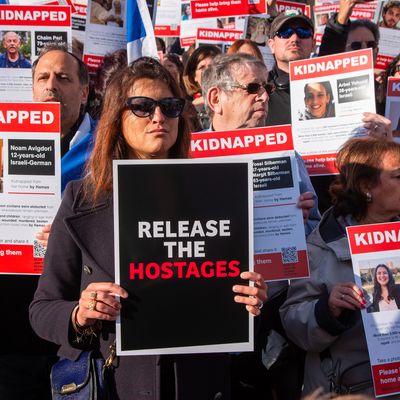
A tense new dynamic is at play in the two-week-old war between Israel and Hamas with the militant group’s release of four Israeli hostages in as many days seeming to complicate plans for a ground invasion of the Gaza Strip.
On Monday, two Israeli women were released by Hamas, which said in a statement on Telegram was happening owing to “compelling humanitarian and health reasons.” Haaretz reports that Yocheved Lifshitz, 85, and Nurit Cooper, 79, were taken from Nir Oz, a kibbutz with around 400 people near the Gaza border, during the October 7 attack by Hamas. Lifshitz’s 83-year-old husband, Oded, remains in captivity in Gaza.
According to Lifshitz’s daughter, her mother is on oxygen and her parents are “no longer the kind of people who can survive without medications,” she told the Times of Israel. The International Committee of the Red Cross said that it “facilitated” the release of the elderly captives out of Gaza through Egypt via the Rafah crossing on Monday night before their eventual return to Israel.
On Friday, American citizens Judith Raanan and her daughter, Natalie, were returned to Israeli forces following negotiations between Secretary of State Antony Blinken and Qatari officials. A number of senior Hamas leaders live in Qatar, which has become crucial to proxy negotiations with the militant group that the U.S. formally considers a terrorist organization.
Hamas fighters captured more than 200 Israelis during the October 7 attack that killed over 1,400 people. Since then, Israel has unleashed a campaign of massive retaliation in the form of air strikes that have killed thousands in Gaza and contributed to a humanitarian crisis in the exclave.
The crisis is expected to get worse when Israel executes its anticipated plan to send troops into Gaza, which the Biden administration is urging Benjamin Netanyahu’s government to delay, according to the New York Times. U.S. officials reportedly want to allow more time for hostage negotiations, fearing that an invasion would make the release of hostages more dangerous and less likely.
Both Hamas and Israel accuse the other for the hostages’ plight: Hamas claimed over the weekend that Israel has refused offers to release more captives, which Netanyahu called “mendacious propaganda.” After previously threatening to kill hostages, senior Hamas officials recently claimed that all of the captives — one as young as 9 months old — would be released to the Red Cross if the “random bombardments” and “total destruction” would end.
U.S. officials also hope that a delay to the invasion would allow for more aid to be delivered into Gaza. So far, only a few dozen trucks full of food, water, and medicine — but no fuel — have been allowed into the territory home to over 2 million who have been without power for nearly two weeks. There may be a tactical reason as well for the American pressure to delay: U.S. intelligence officials reportedly expect Iran-backed forces in the Middle East to attack American forces once the invasion begins. Any delay would allow for more time to prepare.
Although the White House is pressuring an embattled Netanyahu, the U.S. has still not called for a cease-fire. On Monday, Joe Biden responded to a question in a press conference about a cease-fire in exchange for the return of all hostages. “We should have those hostages released and then we can talk,” Biden said.






























